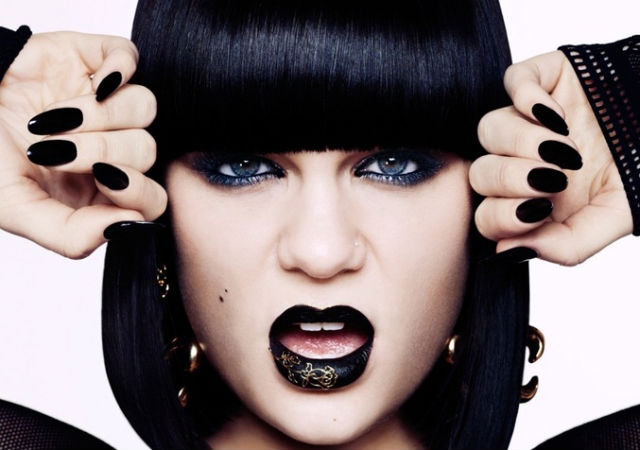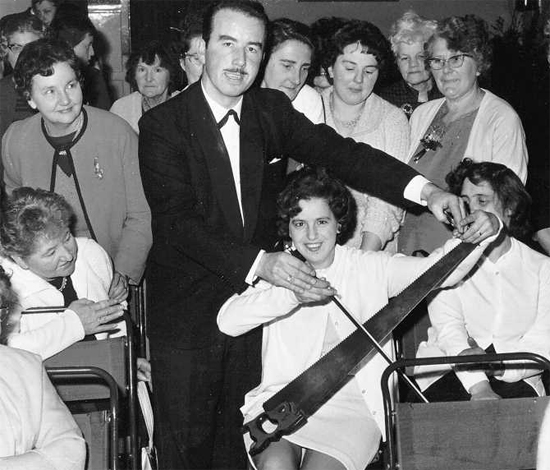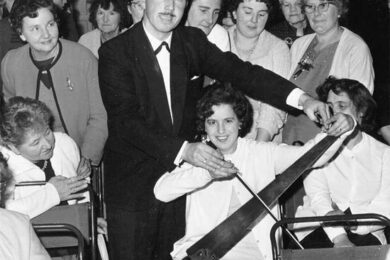It’s second nature now: clubs, radio, ringtones, house-parties, shop soundtrack loops – it saturates our soundworlds such that we almost forget that pop wasn’t always thus. Let’s call it, for want of a better term, the ‘Soar’: a move that’s been creeping into ubiquity in pop songwriting – that surge from a dynamically static mid-tempo 4/4 verse to a ramped-up major-key chorus, topped, in the case of female singers, with fountaining melisma; the moment the producer deploys the riff, the synth-gush, the shouted vocal-hook for which the whole of the rest of the song is a mere appendage, a prologue and epilogue that only the chorus validates. If you’ve heard it – and rest assured, you have – it’s because it developed, as a trope, in some of the most inescapable songs of the last few years: ‘I Gotta Feeling’, ‘Empire State of Mind’ (both Jay-Z-enhanced and solo versions), ‘Tik Tok’, Flo Rida’s ‘Club Can’t Even Handle Me Yet’, ‘California Gurlz’.
Choruses, of course, have always required shifts in key and tempo, have always been central moments of excitement – but it seems we’re witnessing an historic shift in the nature of the chorus, and, more strangely, in the nature of pop itself. For it seems with the ‘Soar’ that the writers and producers believe the chorus, and its expected affect – pop’s overpowering and seduction of us – can be started as if one were flicking on a switch; the sudden, vertiginous leap of the pre-chorus to something like Katy Perry’s ‘Teenage Dream’ seems designed to elicit a purely Pavlovian response, like an electroded corpse twitching when the current’s switched on.
Another factor that differentiates the ‘Soar’ from the time-honoured pop chorus is the way it implies a rhythmic restructuring of song: the curiously unearned bursts of euphoria that puncture ‘I Gotta Feeling’ seem unrelated to what surround them; the song’s individual parts begin to resemble plastic modular bits to shuffled around at will. It’s a structure that denies any room for complexity or thought, verses compressed and claustrophobic, lyrics walled-in by the migraine-hammering beat, as they hurry towards the hands-in-the-air moment, to the central message – "Tonight’s gonna be a good, good night" – delivered with hectoring force. The clumsy delivery of Akon on David Guetta’s ‘Sexy Bitch’ – declaring he’s looking for a description of a woman’s attraction "with-out be-in’ dis-re-speeect-fuuuuuul", the phrases trailed and elongated over the start of the ‘Soar’ – confounds any notion of rap ‘flow’ – and, indeed, the horizontal rhythmic slippage hip-hop implies is replaced here by a profoundly inorganic structure, a monotony of eruptions. It’s a structure that resists the rewind impulse: the listener is shunted from start to end of the track, from opening to verse to chorus to verse to middle-eight to etc. as if on a moving pavement, leaving nothing to reinvestigate, no space or lacunae, no opportunity to track back in memory; nothing lingers. It exemplifies the problem that Neil Kulkarni identified in these pages: that contemporary (read: post-modern) pop can only present us with what we already know, "the endlessly prescriptive, dully didactic cheese shot out by the agony aunt/uncle", that it seems incapable of generating new affects, of re-presenting the shocks that shake our real lives. It realises the old elitist saw about pop: that the industry thinks we’re simpletons.
All this is explainable if you’re willing to swallow it: by the increasing influence of mainstream dance music – house and especially trance – over pop. Apparently hip hop and R&B, which, as a schoolboy, I remember magnanimously suffered to share the charts with dance stragglers like Ian van Dahl, Zombie Nation and Darude, has given up its position of commercial and formal dominance to the latter. The anxieties were already there in Simon Reynolds and Sasha Frere-Jones’ (perhaps premature) notes on ‘the death of hip-hop’ in 2009: its exhaustion as a creative and market force was evidenced by the fact "that rap producers are abandoning swing and syncopation for more pulse-based club rhythms (house/trance/electro-pop), resulting in a shift to a European rather than African-American feel", demonstrated by Flo Rida’s Hi-NRG sampling ‘Right Round’, a track with one hell of a soar.
Aside from the weird essentialism of that argument (the whole black electro sound that post-2000 hip-hop reactivated evolving from Bambaataa playing Kraftwerk) and even if we don’t accept a narrative of decline, it’s difficult not to cop the change from the period when the ripple-effect of the relentless turnover in rhythmic innovation of Timbaland, the Neptunes, Organized Noize, Mr. Collipark, Mannie Fresh and others was felt in even the furthest reaches of the charts – whether in the Numanoid electro sleaze of Sugababes’ ‘Freak Like Me’, the glistening spaces of 2-step, the glorious cellphone racket of Wiley and Dizzee’s early work, or even the swarms of interchangeable neo-soul singers (anyone remember Mary Mary?) You could track the entire shift in one singer’s career: the distance between the Kelis of ‘Millionaire’ – a warped-angled architecture of metallic 808 rattle, sharp pointillist synth and groaning robot noise – and the Kelis of last year’s ‘4th of July’, produced by Will.i.am cohort DJ Ammo, where she strains to do her Eurodiva impression during a sudden (but repeated) piano-house breakdown before riding the verses with a straight face. But even that masks the suddenness of the transition: even in 2008 a production like Beyonce’s ‘Single Ladies’ or the melancholy snap of M.I.A.’s ‘Paper Planes’ could define the chart soundworld; even as late as last year, with the ‘Videophone’/’Telephone’ exchange between Beyonce and Lady Gaga, there seemed still some room for manoeuvre – a hope now cut off by the raging soar driven through the middle of ‘Born This Way’.
But hip-hop’s unseating leaves unanswered the question: why the ‘Soar’, and why now? Some answers can be found, perhaps, in the dancefloor: the demands, it seems, we make of pop have changed. Productions like Aaliyah’s ‘More Than a Woman’ or Tweet’s ‘Oops (Oh My)’, Beyonce’s ‘Upgrade U’ or Outkast’s ‘So Fresh So Clean’, were sci-fi reveries, strange fluid structures whose rhythmic logic exerted a libidinal compulsion almost by stealth, shunting and invading the body as if in the midst of seduction; as Ben Beaumont-Thomas, writing on Notorious B.I.G.’s ‘Nasty Girl’ (2006) said, it "compels your waistline rather than your hands". By contrast, something like David Guetta/Rihanna’s ‘Who’s That Chick’ seeks to tyrannise you, forcing hands to go up and legs to jump, writing itself in bodily motion as the state once wrote its domination on the body of the criminal. It’s a vertical and hierarchical impulse, hands up to the pulpit of the DJ booth or (as in the video for J-Lo’s ‘On the Floor’) the pop-star’s privileged place at the centre of the club (or Pitbull’s overlooking, ho-stuffed private box), rather than the horizontal, rhizomatic congress of the dancefloor. Though to point the finger of blame at mainstream dance ignores the overdetermined, corrupted form its dynamic tropes take in the ‘Soar’: house, centred around seemingly infinite rhythmic plateaux, never had choruses this body-builder grotesque.
It’s a crude, overdetermined excess, as if pop were forcing itself back to its defining characteristics – chorus hooks, melody, ‘accessibility’ – and blowing them up to cartoonish size. A viral anxiety pulses through the steroided architecture of these tracks, a need to give the listener the pay-off, the sonic money-shot, as soon and as obviously as possible, a desperation for transparency and reassurance. It is, perhaps, that of the industry, struggling more than ever to make money off a pop economy made up of Youtube views and Spotify plays rather than singles sales. But we, too, are in the midst of fear. Joshua Clover detects a similar excess in the pop world of 1989, in George Michael’s ‘Freedom ’90’, and Roxette’s ‘Joyride’ and ‘Listen to Your Heart’, as an historic victory for western capitalism that was, in no small part, a propaganda triumph, a false ending to history, generated a compensatory "excess whose dark double is a world without actual events, without direction, without change".

As the economy in Britain and America grinds towards a threatened double-dip recession and late-capitalist culture trembles with ongoing crisis, might we not be confronted with a need for reassurance, a redoubled demand for pop to fulfil its function of serving our desires, in the crudest and most direct way possible, that warps the fabric of pop itself? Certainly, after the disturbing glimpses of possibility pop gave us in the last decade, it now seems intent on assuring us it’s business-as-usual: in Jessie J’s ‘Price Tag’, while the chorus expresses sentiments about non-quantification, the joy that can’t be gained by exchange, in the soar’s hook of "Money, money, money" we still hear the brash, repeated clanging of the cash register. And the bludgeoning insistence with which Jennifer Lopez delivers the hook of ‘On the Floor’: on the huge house soar, she disappears into pop’s signature glossolalia, "la la la la", as if her artificial joy were bursting the constraints of language; it insists that the reality of what Greil Marcus called "economic terrorism" is escapable – "Live your life and stay home on the floor". But we know now, in the strain of that chorus, that paradise is false.



